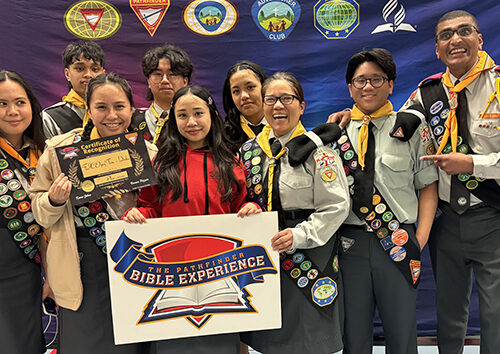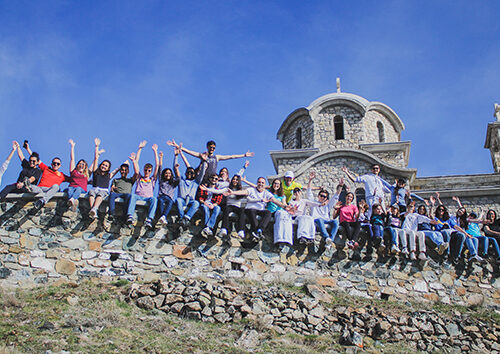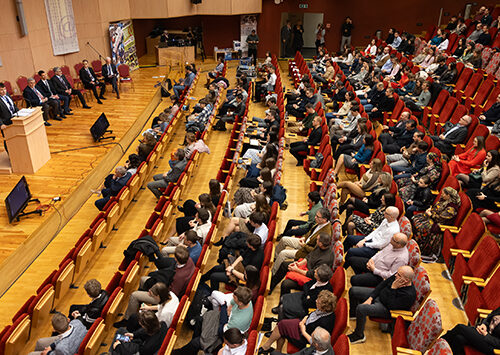1 June 2018 | Dublin, Ireland [Petar Popivanov]
Saturday. Noon. Ranelagh Seventh-day Adventist Church, Dublin. The worship service is finished. The congregation is buzzing. I sense in the air the sweetness of meeting with friends, talking to visitors and reflecting on the sermon.
But there is something else in the air that breaks the pure spiritual frame and brings a subtle but pressing accord corresponding with the emerging cry of my own hungry stomach. Tomato sauce! Kitchen! Lunch! Somebody is cooking.
I sneak incognito into the kitchen to get my cup of tea before lunch, hoping no one will discover my little secret (although the big Starbucks mug says it all). My worry is needless. There are four volunteers in the kitchen but no one is interested in my tea and me. They all stare at the boiling pot on the hob and I realise I am in the middle of a great dispute (“argument”, the politicians would say).
 The tomato sauce is “almost ready” the chef declares. “We need the final touch”. From what follows next my hope for a soon arriving lunch disappears.
The tomato sauce is “almost ready” the chef declares. “We need the final touch”. From what follows next my hope for a soon arriving lunch disappears.
“Lets put some basil” an enthusiastic European lady suggests.
“Can we add some chilly sauce?” the African insists patiently. I know she’s been living in Western Europe for long time now but apparently never got into this basil/oregano Mediterranean type of craziness.
The chef, a professional Brazilian one, seeing the emerging storm, shifts the dispute into more neutral territory: “Maybe we’ll just add some more salt and that’s it?”
 The Jamaican lady, silently washing dishes in the sink, smiles and takes a deep breath. She is about to enter the dispute with her own vision on the right recipe for the tomato sauce.
The Jamaican lady, silently washing dishes in the sink, smiles and takes a deep breath. She is about to enter the dispute with her own vision on the right recipe for the tomato sauce.
The boiling water in the kettle reminds me why I am in the kitchen. I make every effort to concentrate on my tea and resist the temptation to share with the “potluck team” what the “final touch” of the tomato sauce is.
As I leave the kitchen my mind takes me ages ago into my granny’s kitchen. Mmmm, her tomato sauce, with just the right amount of salt and spices.
The tea is burning my lips.
DOING CHURCH
 Doing church is like cooking a tomato sauce (apologies for simplifying it). We all agree on the main ingredient. After all you can’t have tomato sauce made of cucumbers. You need tomatoes. Just like you need Christ and His Word to make church.
Doing church is like cooking a tomato sauce (apologies for simplifying it). We all agree on the main ingredient. After all you can’t have tomato sauce made of cucumbers. You need tomatoes. Just like you need Christ and His Word to make church.
But it is this “final touch” of church doing that creates disputes. “Shall we sing three songs at the beginning and one at the end or the other way around?”
“Shall we collect the offerings before or after the sermon?” “The worship leaders should sit at the pulpit while the pastor is preaching… as it is done in other places”. “It is good to write the names of the visitors in a book at the entrance so the elder will call them to stand up during the announcements, welcome them and give them the visitor’s pack”. Cold chills run through the introvert locked into my European soul.
This final touch! It overflows like a magic porridge pot and leaves the four-walled building we call church. It spreads on different WhatsApp groups, Facebook pages, small home groups and weekend retreats. And before we know it threatens to fill all our spiritual life. To squeeze Christ out of us and suffocate us with the pleasure to have our say about the right “final touch”.
In I Corinthians 12 Paul is describing the church as one body with many parts:
“Just as a body, though one, has many parts, but all its many parts from one body, so it is with Christ. For we all baptised by one Spirit so as to form one body – whether Jews or Gentiles, slave or free – and we all are given one Spirit to drink. Even so the body is not made of one part but of many.”
We are God’s people from “every tribe and tongue and nation”. It is exciting to be part of a global church. But this comes at a price. Different parts of the body show us different things. Celebration and vibrant worship. Evangelical zeal. Holiness and faithfulness. Wisdom and scholarship. Perseverance through suffering. We need all of these to complete the picture of the kingdom of God.
As Al Hsu writes in his article, “Why unity and diversity are the foundation of Multi-ethnic Ministry”:
“There is a dynamic tension between unity and diversity. There is a single unified identity as the one body of Christ. But there is also differentiation with many different kinds of parts. We ought to affirm these two truths simultaneously. Overemphasising unity and ignoring the diversity is called uniformity. ‘We are all Christians and our differences don’t matter!’ But that is not what Paul is saying. We are all baptised by one Spirit into one body but Paul still affirms the ethnic and socio-economic class realities of the parts of the body. Jews and Gentiles, slave and free, male and female, different calling, different gifts and functions – we don’t loose our identity. The other error is to focus too much on the different parts that we lose sight of the one body. That is called tribalism, separatism. It is diversity without unity. Churches historically divided over races and classes.”
Christian theology holds unity and diversity together. That marriage between unity and diversity is what makes us Christians. It is in the very nature of God – One in Three. It is woven into the fabric of marriage – two become one flesh but they are still two individual personalities, gender, cultural and ethnic background.
MY STORY
Becoming a Christian some 25 years ago in a post-communist country was an experience I will never forget. I met all these Christian veterans, survivals from the communist persecutions and oppressions. They had a very strict bunch of rules that helped them keep their identity through the dark years of oppression. Many rules for men and many more for women. A lot of these rules were related to the outer appearance. “We generally don’t wear hats in church. We take them off”. Going to church and especially speaking from the pulpit required proper dress code – “black suit and tie”. Short sleeves in church looked suspicious these days even during the summer.
I still laugh when I remember me growing my first teenage beard. A caring sister pulled me in the corner and said that” Christian men glorify God by shaving every day and don’t let their beards grow like a ram”.
I smile because later I discovered that all the Adventist pioneers had beards. Very long beards! And this is my point. Our culture, ethnicity, and history determine that “final touch” of who we are as Christians.
 Today I have the privilege to worship in a multinational, multi-ethnic and multicultural church. I am enjoying the variety of colours (not only black suits!), tastes and music. I came to realise that if an African woman doesn’t take her hat off when entering the church, it is OK. She wears her hat exactly for the same reason I take mine off – to glorify God.
Today I have the privilege to worship in a multinational, multi-ethnic and multicultural church. I am enjoying the variety of colours (not only black suits!), tastes and music. I came to realise that if an African woman doesn’t take her hat off when entering the church, it is OK. She wears her hat exactly for the same reason I take mine off – to glorify God.
And if the Indian brothers come to church in their ethnic sherwani (not black again) it is OK. They do it for the same reason I wear the black suit – to glorify God.
Because you see, that “final touch” (back to our tomato sauce) is that flavour that only we can bring. This is our identity – cultural, ethnic and historical. And since we all agree on the main ingredient – Christ, we are on a safe ground. The diversity around us can only enrich us.
HOW NOT TO SPOIL THE BROTH
Ideally my article should finish here. The topic is hot enough to continue before reaching too close to home. And maybe if I was writing for public that expects to read only politically correct articles it would have met its purpose. But Paul calls the Word of God “alive and active. Sharper than any double-edged sword, it penetrates…” It is a bit of a surprise that he doesn’t call it a balm but a sword, isn’t it? And that’s why I want to continue where a more politically correct author will stop. Because if we are to do a multicultural church we need to do it right. We need to get the recipe right.
I believe that a mature multi-ethnic church is not just a collection of people of different skin tones gathering in the same building once a week. I believe a mature multi-ethnic church is a family of people of different cultures learning to confront and destroy barriers that the world has placed between us.
This work requires a pastor who labours to ensure that the desired diversity of the congregation is reflected in the leading team.
This work requires that the leading team understands and acknowledges the unique experiences and challenges of each group and leads the church to understand one another and carry the burdens of their brothers and sisters.
This is what happened in Acts 6:1-7. When the “Hellenistic widows complained against the Hebrew leaders” the leaders intentionally appointed Spirit filled men from the same Hellenistic group, to ensure its needs were no longer neglected.
This work requires that every Christian makes a conscientious decision that in the first five minutes after the service he/she will speak to someone not from his culture, race or tongue.
A VISION OF HEAVEN
Because … this is what heaven will be. John describes 12 gates in the new Jerusalem. Four on each side. Those with black suits will enter through the one on the East… Those in colourful dresses through the opposite… Those who like basil in their tomato sauce through the North gate, and the chilly lovers through the South.
But they will all meet at the centre of the city. At the throne of God. “And the nations of those who are saved shall walk in its light, and the kings of the earth bring their glory and honour into it… and they shall bring the glory and the honour of the nations into it” Rev 21:24,26.
“And they sang a new song: “You are worthy!” Rev 5:9
Yes, my granny knew the right ingredients for a perfect tomato sauce. And so, many more grannies like her in India and Zimbabwe, in Russia and Brazil cooked the perfect tomato sauce with the absolutely right ingredients. And they –our grannies and grandpas, our parents, friends, teachers, neighbours and every part of our childhood created deep in us the men and women we are today. And that’s natural.
But when Christ prayed for unity of His church in John 17, he prayed for supernatural unity. And He said that “by this the world will know that you are my disciples!” [tedNEWS]
Petar Popivanov is a Bulgarian living with his family in South Dublin. He says, “As a teenager I grew up in a mono-national, mono-cultural society and church. Many years later I worship with my family in a multinational and multi-ethnic Ranelagh Adventist Church, Dublin. Over the years I developed a strong interest into how our culture and upbringing reflect the way we ‘do church’ in 21st century. For me culture is like a pair of glasses. We look at the world through them without even realising that our own culture is the lens that shapes the things we see.
This thought piece was first published on the Irish Mission website.
________________________________________
tedNEWS Staff: Victor Hulbert, editor; Sajitha Forde-Ralph, associate editor
119 St Peter’s Street, St Albans, Herts, AL1 3EY, England
E-mail: [email protected]
Website: www.ted.adventist.org
tedNEWS is an information bulletin issued by the communication department of the Seventh-day Adventist Church in the Trans-European Division. Readers are free to republish or share this article with appropriate credit including an active hyperlink to the original article.



